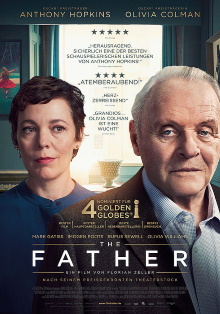Films about the mental degradation that comes with age aren’t novel but this one does add something new: the subjective experience from inside the mind of the afflicted. Anthony Hopkins turns in what some have called the performance of a lifetime and given the kind of career he has had, that is saying something. This is a small scale film as befits an adaptation from a play with small sets and a small cast but it is exceptional at what it does with director Florian Zeller being himself the playwright of the original play.
Anne struggles to find a competent caregiver for her father Anthony who is suffering from dementia and yet insists that he can live perfectly well on his own. For example he keeps losing his watch and insists that it has been stolen but it is actually always in his hiding place that he thinks is a secret. Anne tries to explain that she is moving to Paris to live with a man but this just makes Anthony confused. The next day he discovers a man that he doesn’t recognize in his flat who explains that he is Paul, Anne’s husband, and that this is actually Paul’s flat. When Anne returns from buying groceries, Anthony is confused as he doesn’t recognize her either. We realize that Anthony’s perception of reality is unreliable as he gets faces, the passage of time and places all wrong. When a new caregiver arrives for an interview, he perks up and becomes charming, perhaps because she reminds him of his other daughter Lucy. He tells her all kinds of outrageous stories including how he was a tap dancer but of course none of it is true including his own memories of Lucy.
For a while this film confuses the audience along with Anthony as we try to work out what is going on with the changing faces and décor. But soon enough we realize that it’s a fool’s errand to try to pin down any definitive underlying truth as Anthony’s memories and perceptions are just too unreliable. The different manifestations of confusion and mental degradation shown here will familiar ones from our own experiences with our elders and the films we’ve seen before but it is still striking to see them from inside the subjective experience of the patient. From Anthony’s perspective, he remains perfectly rational and competent, even evincing pride in his intelligence. He hates it when people talk down to him as if he were stupid and insists that they speak properly and respectfully. But the world around him is confusing and he doesn’t understand why. Perhaps the people around him are playing pranks on him or deliberately cruel to him and he even suspects his daughter of wanting to inherit his flat. Yet all the while his condition grows worse and worse until he has difficulty even dressing himself and seemingly regresses in age. All this and more is aptly set on film here and Hopkins incredible achievement is in being able to so quickly change from one emotional state to another and even being able to convincingly come across as a lost child.
As my wife notes however, the film doesn’t fully restrict itself to Anthony’s point of view. Some scenes seem to be fully from Anne’s perspective as Anthony is entirely absent, yet the narrative in them isn’t consistent either, which I find irritating. While it is understandable for Anne to fantasize at times about her father dying to save her from all the trouble, that is a trite point to make that in my opinion isn’t worth stepping outside of Anthony’s perspective to make. I also note that the film chooses to emphasize the drama of Anthony’s tragedy and skips the medical interventions that attempt to alleviate his problems. So we see Anne and Anthony going to see the doctor but skip over the actual discussion they have with the doctor. These choices align with the director’s artistic vision and I do respect that, but in real life, the doctor would probably have recommended practical measures like putting reminder tags and notes everywhere in the house, placing clocks and calendars and so on, which can help the patient feel less confused about the world.
Overall there’s is no doubt that this is an outstanding film and one of the best ones so far in depicting dementia. I am amazed that the people around Anthony can be so patient and so understanding in explaining the same things to him over and over again and putting up with what must have been an abrasive personality in his prime. While Hopkins’ performance here is indeed as good as everyone says, I don’t think his character here is interesting enough to warrant this being his defining role. It seems that he will get another chance though as this film is getting a sequel by the same director with Hopkins again playing the role of Anthony.
